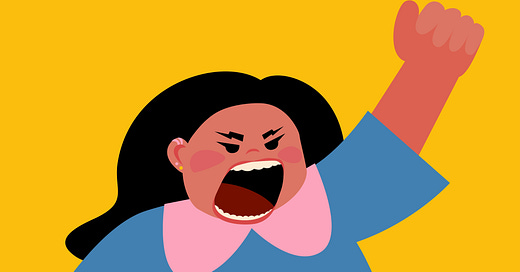When the Noise Feels Too Loud: Understanding and Easing Noise Sensitivity in Parenthood
How to navigate the noise of parenting and find relief without guilt or shame
As the festive noise picks up a gear, I wanted to share some compassionate words for those who find the noise…alot. Don’t forget to take a moment to tune in to today’s Episode of The Therapy Edit for 20 soothing minutes. Plus, The Frazzled Mums Club membership is now only £5 per month for zooms, voice notes and community (annual membership). Find out more here.
Is it possible to love your kids with all your heart and still feel like the noise is too much?
Have you ever wondered why the sound of laughter or squealing feels like it’s triggering something inside you, instead of making you feel at ease?
My kids are playing happily, running, shouting, squealing. And instead of a feeling of warmth and gratitude at the happy noises of my kids, my body is tensing and I’m having to stop myself asking for quiet. I feel a wave of shaming guilt. ‘You’re a mum. They’re your kids. You should be happy they’re playing nicely’.
This feeling isn’t rare for me. The riding of a hot wheels car over a radiator vent find me wanting to beg for silence. And don’t even start me on the noise of meltdowns, fighting in the backseat of the car, or the squeaky playing of a whistle given in a party bag. If this resonates in any way, you’re not alone.
So, as a Psychotherapist, I did what I always do. I applied my understanding of Psychology to my own experience hoping that I might have some insight that will help others. Read on to find out why you feel like this along with ten quick tips to help ease the feeling.
How common is noise sensitivity?
When I shared a poll on social media about whether others experienced noise sensitivity out of the 2,363 respondents 98% related. So, we can conclude, that noise sensitivity is common and is not a statement of a lack of love, tolerance or gratitude for your child.
Side note: If you experience this type of sensitivity all the time, you might have misophonia - abnormally strong reactions to everyday sounds that may usually go unnoticed. Noise sensitivity can also be a sensory symptom of autism or attention deficit hyperactivity disorder. If this is the case, this article will help, but in addition you may need a referral to an ear specialist to explore any physiological causes, and to discuss a care plan with your healthcare practitioner/Doctor which may include CBT or other therapies.
When is noise sensitivity likely to occur?
You may find you are more sensitive to noise when:
You’re experiencing hormonal shifts such as PMS, perimenopause or menopause
Sleep quality is reduced by drinking alcohol, sleep deprivation, insomnia, unsettled kids!
You have increased levels of stress hormones
You are feeling overwhelmed
You are feeling run down or unwell
Noise sensitivity signals that nervous system is feeling overwhelmed, or you’re depleted in some way. Therefore your brain is struggling to determine what noise is ‘safe’ or ‘threatening’. It might be that you are experiencing an overwhelming level of sensory input, and your brain and body are craving space and quiet as the antidote, but either those things aren’t available, or you are continuing to overload yourself with noise and information by choice (constant music playing a scrolling).
Basically, the crux of the matter is that you haven’t morphed into a raging, intolerant, unloving person, you’re just feeling overwhelmed and overstimulated and therefore your brain is registering new stimulus as threatening and triggering the nervous system stress response further, finding you wanting to fight or flee. Knowing this fact is so pivotal. When we stop getting frustrated with ourselves, and find some clarity, we are freed up to do things that help.
What can I do to reduce noise sensitivity?
Well, as we know, the main antidote to overwhelm is rest, refuelling, recovery, re-grounding. The opportunities are few and far between, often needing to be planned or negotiated. It may well be that the things that will help increase your capacity to process the noises around you are the very things that are tricky to find in early motherhood – space, rest and quiet! But don’t fear, I have some tips for you that will help regardless as to whether you can access these things in the moment or not.
First and foremost, it is vital that you find some compassion for yourself. When you lurch into self-criticism and self-talk that sounds like ‘you should be more patient’, then you’re less likely to seek supportive tools and resources that will help give your nervous system what it needs to feel safer and less triggered. My book ‘Raising a Happier Mother’ is packed with ways to address the overwhelm that comes with parenting, that don’t include stepping away from it.
Prioritise rest
I know it’s hard to prioritise rest and space when you are constantly in demand, but think about how you might make this happen for yourself, even if it’s in a small way. Noise sensitivity over your usual tolerance level shows that your body is in a state of overwhelm and stress.
Here are some small ways to refuel:





